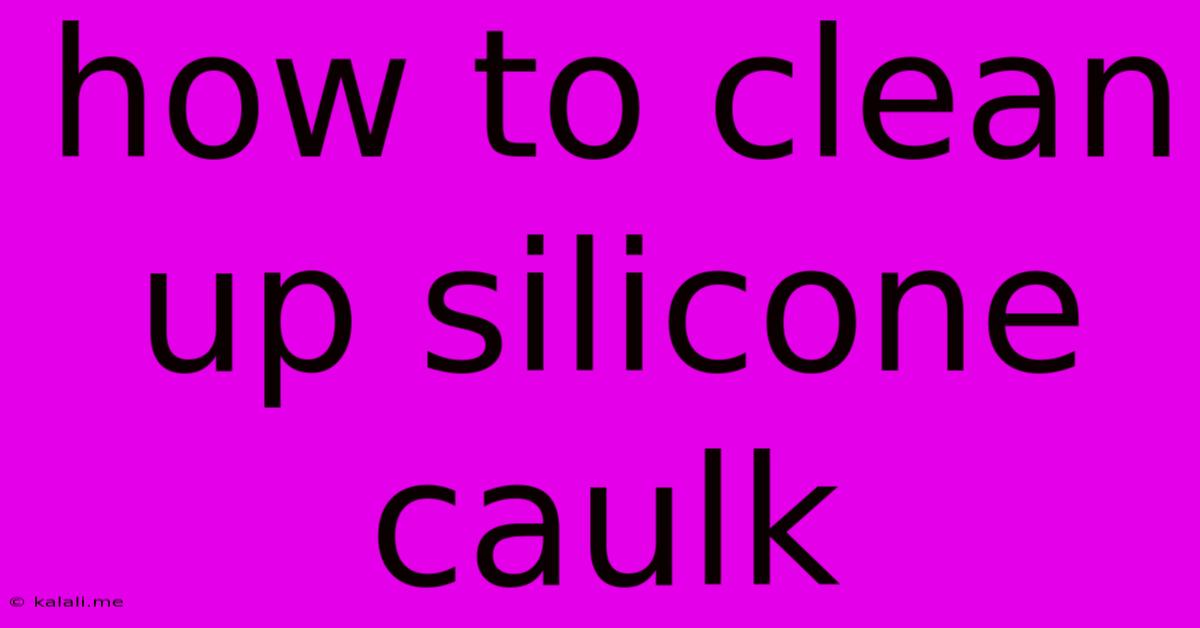How To Clean Up Silicone Caulk
Kalali
Jun 05, 2025 · 3 min read

Table of Contents
How to Clean Up Silicone Caulk: A Comprehensive Guide
Removing silicone caulk can be a messy and frustrating task, but with the right tools and techniques, you can achieve a clean and professional finish. This comprehensive guide covers everything you need to know about cleaning up silicone caulk, from choosing the right tools to tackling different types of surfaces. This includes cleaning up fresh caulk, as well as hardened caulk removal.
Understanding Silicone Caulk's Challenges
Silicone caulk is incredibly durable, making it excellent for sealing and waterproofing. However, this durability also makes it a challenge to remove. Its sticky, elastic nature adheres firmly to various surfaces. Before you begin, remember that the best approach involves preventing messes in the first place, which involves careful application of the caulk.
Tools You'll Need
Before you start cleaning, gather these essential tools:
- Putty knife (plastic or metal): A plastic putty knife is less likely to scratch surfaces but a metal one might be needed for stubborn caulk.
- Utility knife: For precise cutting of excess caulk.
- Caulk removal tool: Specifically designed tools are available for easier caulk removal, especially for tight spaces.
- Cleaning rags or paper towels: Absorbent cloths are essential for wiping away residue.
- Mineral spirits or isopropyl alcohol: Solvents help soften and dissolve silicone caulk.
- Silicone caulk remover: Specialized removers are available for tougher jobs.
- Safety glasses and gloves: Protect your eyes and hands from chemicals and sharp tools.
Cleaning Up Fresh Silicone Caulk
The easiest time to clean up silicone caulk is immediately after application.
- Use a damp cloth: Wipe away excess caulk before it cures completely. This is the simplest and most effective method.
- Sharp tools for precise removal: If a damp cloth isn't enough, use a plastic putty knife or your finger (with a glove on) to gently remove excess caulk.
Removing Hardened Silicone Caulk
Hardened silicone caulk requires more effort and the right tools.
- Soften the caulk: Apply mineral spirits or isopropyl alcohol to the hardened silicone. Allow it to sit for a few minutes to soften the material.
- Use a putty knife: Carefully scrape away the softened caulk. Work slowly and patiently to avoid damaging the underlying surface. A sharp blade is key here. Consider using a caulk removal tool for tricky areas.
- Multiple applications may be necessary: For very stubborn caulk, you may need to repeat the softening and scraping process several times.
- Specialized removers: For especially tenacious caulk, a commercial silicone caulk remover might be needed. Always follow the manufacturer's instructions carefully.
Cleaning Different Surfaces
The cleaning method can vary depending on the surface material.
- Glass: Glass is relatively easy to clean. Use a razor blade scraper (carefully!) or a plastic putty knife to remove the caulk, followed by glass cleaner.
- Painted surfaces: Exercise caution to avoid damaging the paint. A plastic putty knife is recommended. Test a small, inconspicuous area first.
- Wood: Wood is more susceptible to scratches. A plastic putty knife and gentle scraping are crucial.
- Metal: Metal is more durable and can withstand more aggressive cleaning methods. However, always test in an inconspicuous area first.
- Tile: Similar to metal, tile is generally robust. Use appropriate tools and techniques depending on the type of tile (ceramic, porcelain, etc).
Post-Cleaning Tips
- Thorough cleaning: After removing the caulk, clean the area thoroughly with a suitable solvent and rag to remove any residue.
- Surface protection: If necessary, protect the cleaned area with a suitable sealant or paint to prevent future damage.
- Safety first: Always wear appropriate safety gear, including gloves and safety glasses, to protect yourself from chemical exposure and sharp tools.
By following these steps, you can effectively clean up silicone caulk and leave your project looking its best. Remember that patience and the right tools are essential for a successful caulk cleanup. Dealing with silicone caulk effectively involves preparation, appropriate tools and careful technique. With practice, you'll master the art of silicone caulk removal.
Latest Posts
Latest Posts
-
What Does Elephant In The Room Mean
Jun 06, 2025
-
As A Balloon Is Inflated What Happens To The Pressure
Jun 06, 2025
-
Privacy Issue If I Use Employers Vpn
Jun 06, 2025
-
How To Drill A Hole In Tile
Jun 06, 2025
-
Can You Dance With Your Martal Arts
Jun 06, 2025
Related Post
Thank you for visiting our website which covers about How To Clean Up Silicone Caulk . We hope the information provided has been useful to you. Feel free to contact us if you have any questions or need further assistance. See you next time and don't miss to bookmark.